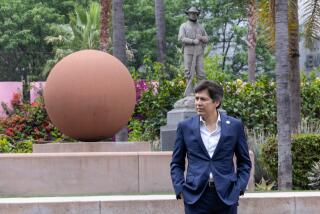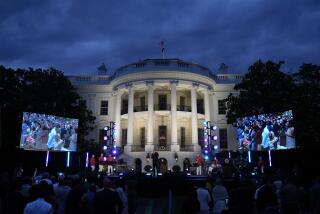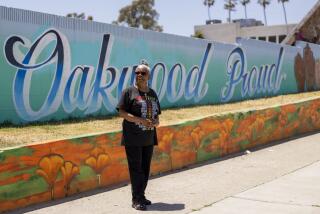Student Ceremonies Mark ‘Juneteenth’
- Share via
That slavery might be more than a sordid chapter from America’s past was the lesson of a “Juneteenth” commemoration in Pacoima on Wednesday.
Juneteenth, or June 19, celebrates the day in 1865 when slaves in the Texas Panhandle and parts of Arkansas, Louisiana and Oklahoma learned of the Emancipation Proclamation, signed 2 1/2 years earlier by President Abraham Lincoln.
For the record:
12:00 a.m. June 21, 1996 For the Record
Los Angeles Times Friday June 21, 1996 Home Edition Metro Part B Page 3 Metro Desk 2 inches; 42 words Type of Material: Correction
Juneteenth--Because of an editing error, a story in Thursday’s Times incorrectly described the meaning of Juneteenth. The holiday commemorates the day that slaves in Texas learned belatedly of the Emancipation Proclamation, which had been signed by President Abraham Lincoln two years earlier.
More than 50 adults and youngsters participated in ceremonies sponsored by Los Angeles City Councilman Richard Alarcon at the Pacoima Community Youth Culture Center.
They heard storyteller Leslie Perry share folk tales from 19th century plantations, while Alarcon criticized the existence of sweatshops and the burning of African American churches in the late 20th century.
Cantrilla Bland, 14, of Pacoima, was one of five members of the Maclay Middle School Cadet Corps brought to the breakfast ceremony by Harry Talbot, Maclay’s dean of students.
“I learned that slavery wasn’t just back in the past, and it wasn’t just about African Americans,” she said. “It is something that can happen to people who are working in factories today.”
The irony of slavery in a country founded by people wanting to be free was not lost on seventh-grader Angelo Ortega.
“It’s tragic to think that someone was in America because they were dragged out of another country,” he said. “I learned that even in the 21st century we could still have slavery here. You should keep people free from that kind of stuff.”
Later in the day, Alarcon introduced a motion asking city officials to establish a “community crisis relief fund” as a means of collecting and distributing money and other donations to communities in parts of the country where black churches have been burned over the past 18 months.


